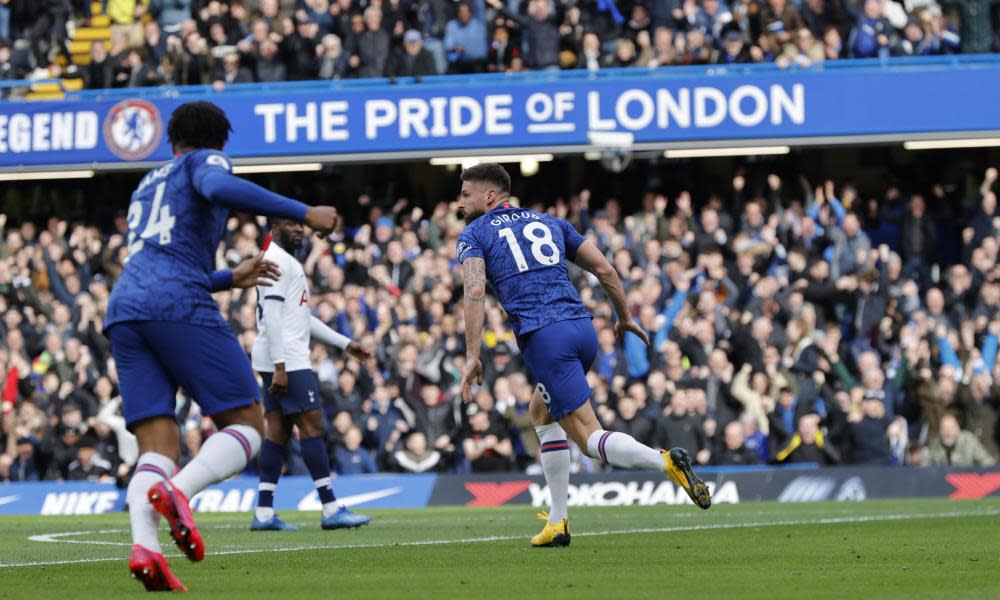Olivier Giroud enlivens Chelsea and Tottenham’s mediocrity derby

There was still plenty to love, of course. There always is in this fixture: whatever the standard, whatever the stakes. Here, it was Chelsea’s two smartly taken left-footed goals, the first a sharp chance for the irrepressible Olivier Giroud, the second a thunderous finish by Marcos Alonso, a player who for all his manifold qualities never looks happier than when trying to leather a football as hard as he possibly can.
Giroud was a delightful, puppyish presence: starved of a first-team start since November and eager to make up for lost time. Perhaps his greatest quality is the disruption he creates: the awkward elbows, the outstretched toes, the way he shovels defences out of shape, burrowing space from which teammates can profit. Often this is referred to as “ugly work”. In the grappling hands of Giroud, it is elevated to something approaching high art.
Related: Olivier Giroud ends goal drought with stunner in Chelsea’s victory over Spurs
Chelsea’s midfield were good, too, at least until the last half-hour, when they mysteriously vanished. For Tottenham, Giovani Lo Celso remains their guiltiest pleasure: an electric, highly watchable player who aside from his humming energy and ambitious passing appeared on a personal mission to leave his studs in as many Chelsea players as possible, and was extremely lucky to see out the game.
Plenty to stir the soul, then, but for a game of such importance, the overall sensation was one of anticlimax. This was, we were told, a fixture loaded with significance: a local derby doubling up as a Champions League shootout. And yet there was a certain irony in the fact that a game so pivotal to qualification for next season’s competition perfectly demonstrated why these two teams are likely to go no further in this season’s.
Chelsea and Tottenham may yet manage to find their way past Bayern Munich and RB Leipzig. But on this evidence it’s easy to see why the odds are stacked against them.
Devoid of strikers, rhythm and confidence, Tottenham displayed many of the same flaws that were in evidence against RB Leipzig in the Champions League on Wednesday night: a lack of courage and variety in possession, a lack of pressure on the ball, a lack of autonomy and positional fluidity that makes them vulnerable to overloads. Here, it was right wing-back Japhet Tanganga – a nice experiment that has probably run its course – who was overwhelmed by Alonso, Ross Barkley and Mateo Kovacic all tracking left to isolate him.
A theoretically box-office trio of Lo Celso, Harry Winks and Tanguy Ndombele soon discovered that there isn’t much use in having a ball-playing midfield if you don’t have the ball. The statistics will tell you that Tottenham narrowly shaded possession, but the bulk of it came after going 2-0 down. Until that point, Tottenham had just 37% of the ball, which is what happens when you pump endless aerial balls for Steven Bergwijn (5ft 10in) and Lucas Moura (5ft 8in) to contest.
And yet Chelsea so nearly threw this one away. In a way, their gradual retreat from the game mirrored so many of their recent late collapses: Brighton and Newcastle away, Bournemouth and Arsenal at home. No team has conceded more Premier League goals in the last 10 minutes, and as they flapped and panicked and worked themselves out of position, you could see why.
Do either of these clubs actually deserve to be in the Champions League? Taking a historical view, probably not. In 2016-17, Arsenal scored 75 points and still finished fifth; at Chelsea’s current rate, they would finish fourth with a haul of just 62 points, the lowest since Liverpool in 2004.
One of the main arguments you hear in favour of the financial stratification of the game is quality: yes, football may be skewing towards the elite but at its upper end the spectacle is better, faster and more entertaining than at any point in its history. This game, featuring roughly £1bn-worth of playing talent and yet largely poor in terms of technical quality, was its own resounding counter-argument. As is the abject state of Manchester United and Arsenal, two other clubs who have ploughed billions into their own bedazzling mediocrity.
And yet one – possibly two – of these teams will parachute straight into next season’s Champions League group stages, ahead of the likes of Porto or Ajax or Red Bull Salzburg (who will all probably have to pre-qualify). It’s been one of the least enthralling top-four races in recent memory, and yet you still wonder whether it could serve up a fascinating twist. Wolves and Sheffield United: it’s over to you.

 Yahoo News
Yahoo News 